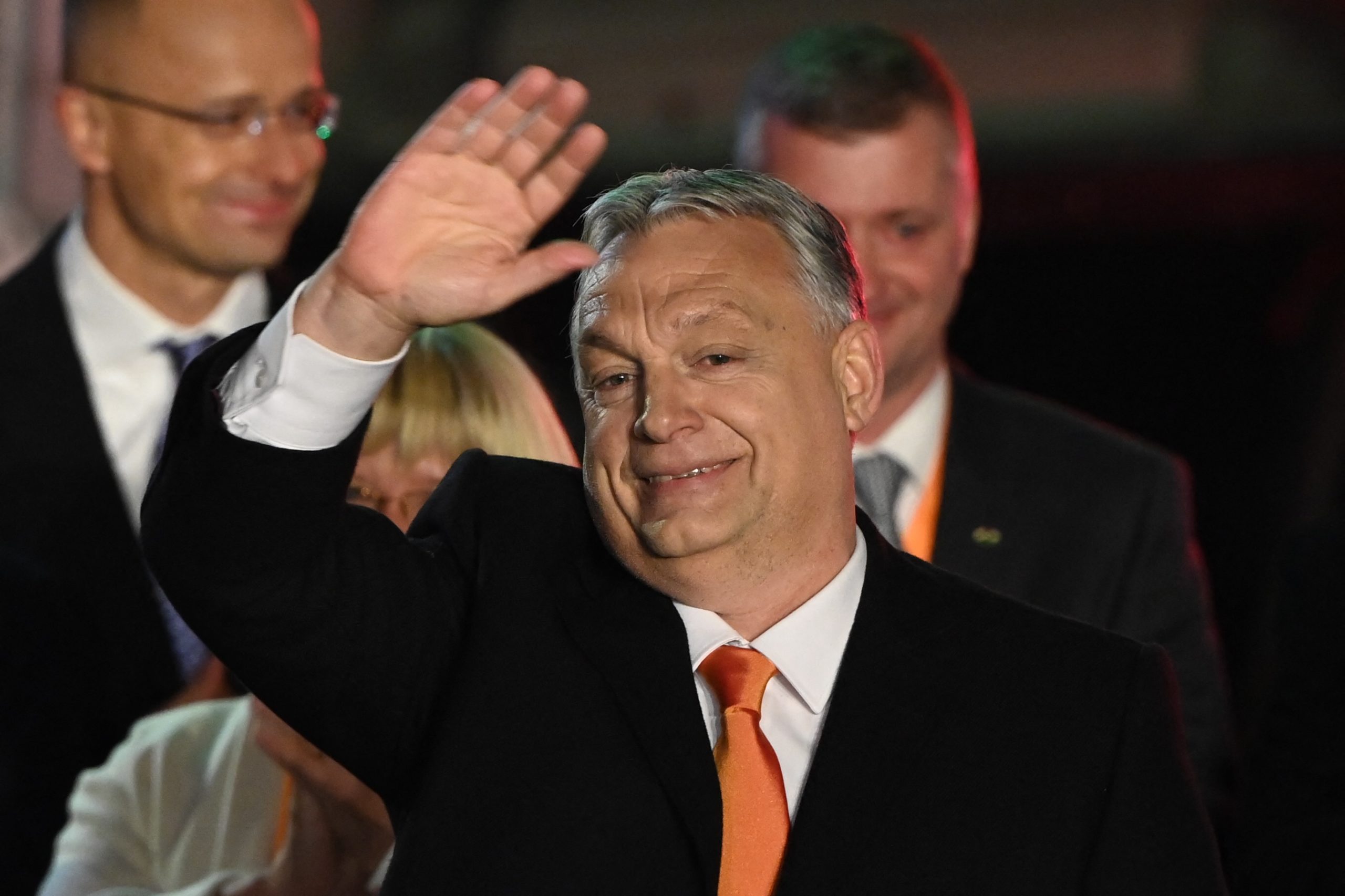
In the middle of Central Europe is a small nation of great traditions: even when it was part of the Habsburg empire, Hungary has maintained an ancient language and culture, pride in its military traditions, and a congenital scepticism against all the great powers around it, from Germany to the Soviet Union in the Cold War years, from the European Union to Russia today. Its membership of the European federation is the result of pure opportunism, and is constantly being questioned, both by politics and by the mood of the crowd. Yet neither NATO nor Brussels can give up a strategic area like Hungary – just as it is the case with Turkey. And so the local government can afford to abrogate democracy, and still win elections.
The war in Ukraine has not changed anything, quite the contrary. On 3 April 2022, Hungary voted to renew its parliament and, contrary to the hopes of many Europeans, Viktor Orbán won again. As always in such cases, the most short-sighted international observers try in vain to explain how this could have happened. Why does the population accept the reduction of democratic space, without repression? What are the winning features of the openly anti-democratic political line adopted by Orbán? It is not only Hungary that is at stake, but the democratic chimera of the 20th century, which has come to an end in this first part of the 21st century.
The political line of Viktor Orbán
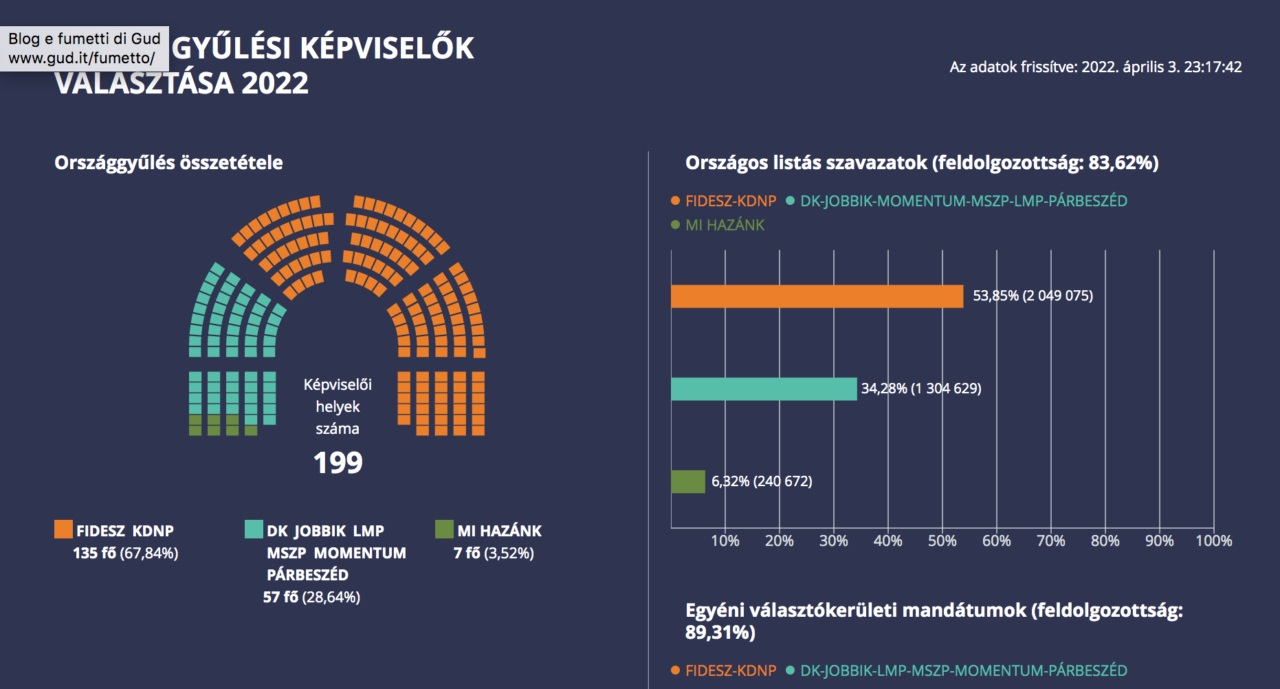
The results of the parliamentary elections in Hungary[1]
Viktor Orbán’s Christian Democratic Party (Fidesz-KDNP) won its fourth term in office with a landslide victory over the joint six-party opposition (which brought together almost all parties, from the left to the populist right), with a 69.54%[2] turnout, slightly down on four years ago[3]. The defeat of the pro-European opposition was crushing: Fidesz obtained 53.10% of the preferences (2.8 million votes) against 35.04% (1.8 million votes) of the coalition Alliance United for Hungary and 6.2% (0.3 million votes) of the extreme right-wing party Jobbik (JobbikMagyarországértMozgalom): fascist[4], neo-Nazi[5] and anti-Semitic[6]. In terms of seats, the governing party won 135 seats compared to 56 for the United Alliance for Hungary and 7 for Jobbik[7]. This means that, compared to the 2018 elections, in which Fidesz had won 133 seats, Orbán has strengthened[8] .
The losers are embittered by the fact that, in theory, the high turnout should have favoured the opposition parties, which were unable to wrest consensus from rural areas: the 2018 vote had already penalised the Hungarian Socialist Party and also Jobbik, despite the fact that they had abandoned Euroscepticism[9] and a certain populism[10], and relied on the hope of convincing Hungarians who had emigrated abroad to return home[11] . This time all parties were allied against Orbán, and things went even worse: because the one who convinced the people that he knew how to govern, even after the involution of Fidesz, won. While in the late 1980s the party held liberal positions and was in favour of European integration, after the first elections in post-communist Hungary the party embraced a nationalist and illiberal drift – and this worked. Hungarians accepted a gag law against the free press and a law abolishing universal suffrage for ethnic minorities[12].
The two-thirds majority that Orbán enjoyed for years allowed him to cancel the independence of the central bank (Magyar Nemzeti Bank), merging it with the government’s authority to control the financial markets[13]. Then he introduced the systematic political appointment of judges[14]. European Commissioner Viviane Reding warned: “Some aspects of these reforms raise serious questions about the law in the European Union”[15]. European Commission spokesman AmadeuAltafaj, in agreement with the concerns expressed by the IMF, reiterated: “The common European objective of price stability surveillance is best served by an independent central bank, not by an institution subservient to political power”[16].
According to Eötvös (Hungarian Academy of Sciences), the Hungarian situation is common to that of all Central and Eastern European countries and is a consequence of the small size of their economies and their strong exposure to internal political and social tensions, which accession to the European Union has accentuated[17]. Membership is not ideal, but pragmatic: the EU means a strong currency, greater purchasing power on foreign markets[18], and for the strong countries an area with lower production (and labour) costs, all in a geopolitical context in which the United States has been happy to expand the borders of NATO: the fruits of this expansionism are now before our eyes, both in terms of the pollution of the European banking system by derivatives, and in terms of stability and peacekeeping[19].
The shifting and opportunistic attitude of eastern governments, and their clear anti-democratic temptations, prompted the EU to introduce in 1999 a safeguard measure in Article 7 of the current European Treaty[20] that denies their citizens (except in the case of a military coup) the possibility of defending themselves at European level against harassment at national level[21]. This rule allowed Hungary, especially after the publication (2018) of a report on Hungarian human rights by Amnesty International[22], to prevent NGOs from operating on their territory[23], introducing prison sentences for collaborators of these associations who had helped asylum seekers[24] and a tax on public funding of these associations[25].
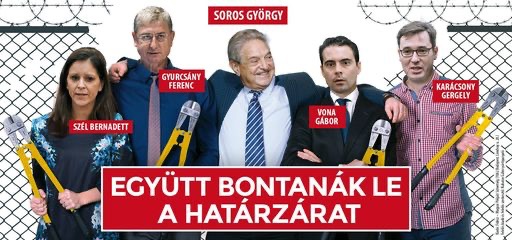
Fidesz election manifesto against the influence of Soros and international NGOs[26]
This decision has led to schizophrenic consequences – because it obviously reduces the influx of migrants into Hungary[27] – which, especially in neighbouring countries such as Austria and Germany, is viewed favourably[28], but at the same time has cost Budapest an infringement procedure by the European Union[29]. The dispute allows a couple of salient aspects of Orbán’s election campaign to emerge: (a) one of the most popular posters of the 2018 election campaign consists of a photomontage depicting George Soros (the Hungarian-born billionaire who finances many global NGOs) holding under his arm all the leaders of the opposition parties, from the Socialists to the right-wing Jobbik[30]; (b) another poster, openly xenophobic, speaks to Hungarians’ fear of being overwhelmed by migratory flows[31] and justifies laws to curb entries[32] and organise expulsions[33] .
Already for 20 years the percentage of Hungarian voters willing to vote for populist parties has risen to two-thirds of the citizenry – the highest in the European Union[34]. A citizenry that has long been looking for a charismatic leader who will take responsibility for addressing and resolving fears[35]: Viktor Orbán, who brings together and brings together right-wing populism (anti-European and reactionary) and left-wing populism (criticising capitalism and globalisation[36]: since the 9/11 attack and the subsequent financial crisis of 2008, the fears of these groups have converged in the fear of the different and of unemployment, and have led to the acceptance of a progressive reduction in human rights for entire communities[37].
It is not Brussels’ stances or the demonisations of the progressive press that are needed to stem this drift, as it is precisely these stances that feed the mistrust that drives citizens into Orbán’s arms[38]. Just look at the two Hungarian parties, the extreme right-wing Jobbik and the Fidesz party, as Jobbik’s former leader, GáborVona, explains: “What Jobbik represents today is much more like the Fidesz party of the past, while today’s Fidesz is much more like the old Jobbik”[39] . A surprising statement if we bear in mind what Vona himself declared in 2012: “We are not communists, we are not fascists, we are not national socialists, but we are not democrats either”[40].
Confirming the goodness of Orbán’s strategy, Jobbik has lost votes as its orientation has taken on a more moderate, centrist and pro-European character[41]. A huge transformation process, if one thinks that in Budapest, on May 4, 2013, in conjunction with the Jewish Congress, neo-Nazis and Jobbik voters paraded through the streets under the cry of “Stop Judapest” Hungarians still supported by Jobbik[42].After all, as analyst Aron Coceancig explained, the complex Hungarian situation is the result of “all the recent totalitarianisms: people have suffered Nazism and Stalinism. Families are still divided by political affiliations”[43]. In order to understand Eastern Europe, one has to accept that, for them, “right” and “left”, politically speaking, do not have the same connotations that we are used to: for example, in Romania, the pro-Europeans are on the right[44].
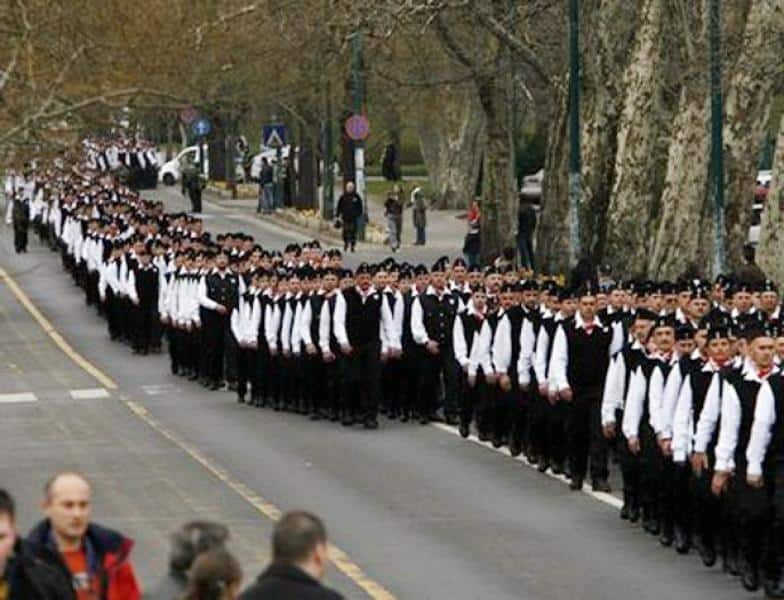
Jobbik demonstration in Budapest in 201[45]
According to Aron Coceancig, beyond ideologies, “people expected more” because “there is scepticism towards distant palaces full of bureaucrats”, the same scepticism that Orbán is counting on to win, shifting the blame for the country’s difficulties onto Europe, “a bit like they did before with the Soviets, and before that with the Germans”[46]. The war in Ukraine makes things worse, because it has reinforced both the ambivalent attitudes of the Hungarian leadership in foreign policy (halfway between NATO, Russia and China) and the autonomist, sovereignist and nationalist positions that, in the past, have slowed down the adoption of the Euro. If there is one certainty for the Hungarian people, it is the fear of the Russians. Victory in the elections of 3 April 2022 is therefore a victory against the “imposing international power centres” of the European Union, against George Soros, against the world media and even VolodymyrZelensky, who accused the Hungarian president of being “the last in Europe to still support Vladimir Putin”[47].
Hungary’s “neutrality” in the war in Ukraine has caught the mood of the citizens, as Orbán recalled: “The left has made a pact with the Ukrainians to drag Hungary into the war. But it is not our war”[48]. It is also difficult for the vast majority of Hungarians not to share the Hungarian Prime Minister’s opposition to sanctions against Russia, given that Budapest depends on Moscow for 85% of its gas supplies and 60% of its oil supplies[49]. The opposition’s argument (“Orbàn has yet to decide whether to stand with the victims of Ukraine or with the murderers, he doesn’t want to be rude to his friend Putin”) thus becomes a naive statement of someone who has not understood the mood of his country[50]. Perhaps it would have been better to focus on the economic crisis, the management of the pandemic and the gradual abrogation of the rule of law: all topics obviously evaded by Orbàn, but unfortunately forgotten by the opposition[51].
Orbàn has made an openly populist choice, increasing pensions, subsidies for dependent children, tax exemptions for young people, pay rises for the armed forces, discounts on electricity and gas bills, measures to contain prices, and so on, increasing the state deficit by 5 billion euros and causing inflation to explode above 7%, as the Hungarian Central Bank itself pointed out, but without people understanding the connection[52]. What is certain is that because of its ‘friendship’ with Putin, Hungary now finds itself isolated in a Europe where even Poland and the other Visegrad countries have distanced themselves from Budapest in the face of the Russian threat.
But the Hungarian government has identified a way out: China – something that has long been seen by NATO as a serious security threat[53]. With the ‘Silk Road’ project, in which Hungary is the main pillar[54], China is penetrating Europe, creating an embarrassing financial dependence: the case of Montenegro, which risked getting into debt to the point of ceding to Beijing ownership of infrastructure built with Chinese loans, is a case in point.
China and the fake parties
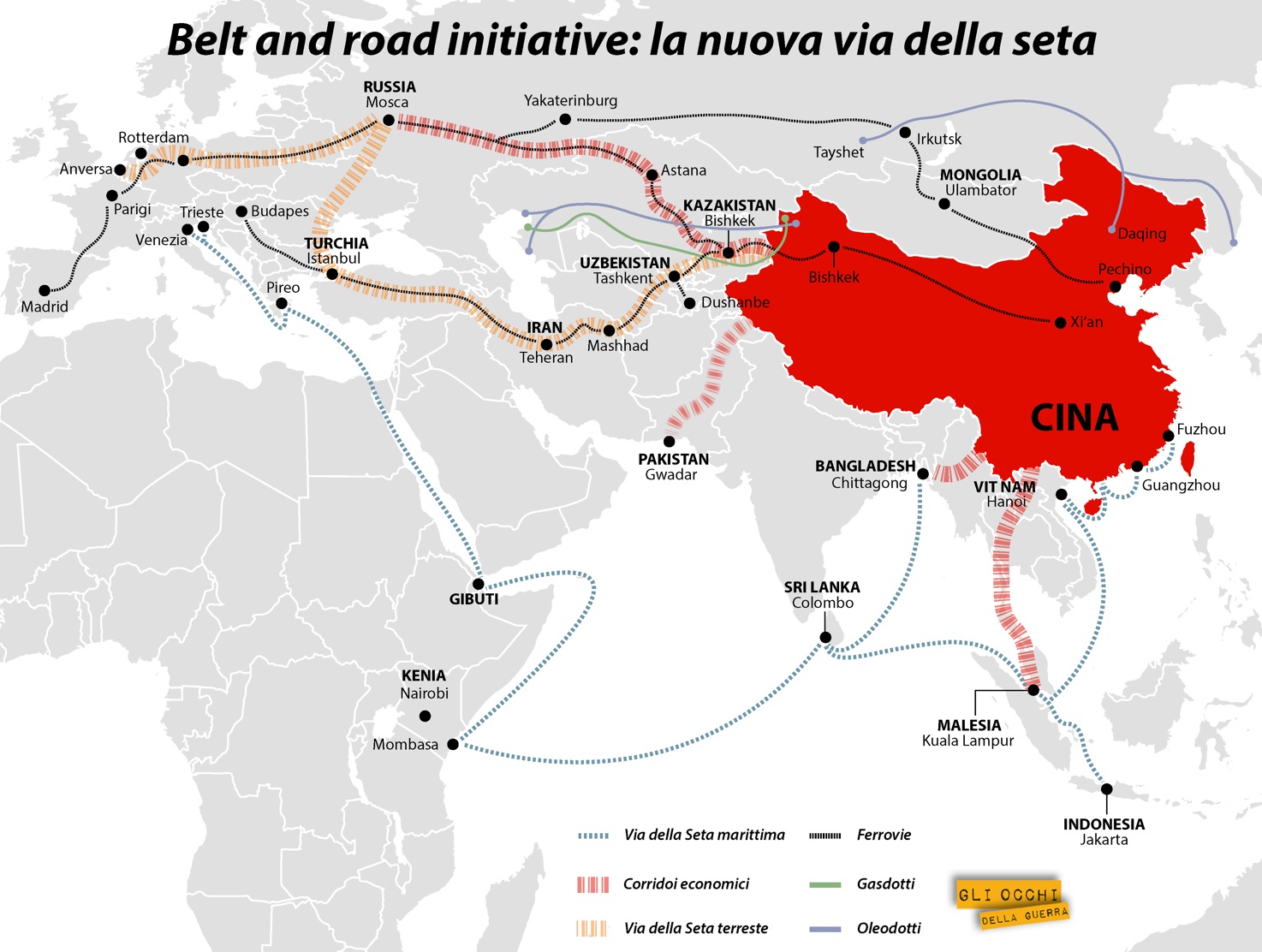
The routes of the New Silk Road[55]
Over the past ten years, Orbán has signed a series of contracts that, according to the American Enterprise Institute (AEI), essentially amount to a ‘debt trap’[56]. In addition, Huawei, the Chinese telecommunications giant, expelled from networks in half of Europe on suspicion of espionage, announced back in 2011 that it would establish its logistical headquarters in Hungary: according to AEI, Hungarian agreements with Beijing are worth over EUR 5 billion[57]. Also under consideration is the construction of a Chinese university campus: the Fudan University, capable of housing 8,000 students and 500 academics on an area of 520,000 square metres – a megalomaniac project costing 1.5 billion euros, of which 1.3 billion paid for by Beijing[58].
The European Union is concerned, which is why it does not react when Budapest complains that in Ukraine, and more precisely in Transcarpathia, in the area of the city of Uzhhorod, about 150,000 Hungarian-speaking people are treated like pariahs[59]. This is an issue that has actually favoured Moscow in blocking Kiev’s attempt to join NATO[60]. During his visit to Moscow in February 2022, Viktor Orbán told the press that Hungary’s friendship with Russia and China was an aid to international détente[61]. During that visit the Hungarian prime minister signed the Russian financing of the Paks-II nuclear power plant, the extension of the gas supply contract at a price described by Orbán as “the lowest ever”, the production of the Russian vaccine Sputnik V in Hungary[62].
The European Union cannot hope for opposition parties which, as many analysts explain[63], are mostly political parties without a real programme, founded with the sole intention of obtaining public funding – fake parties[64]. According to analyst Miklos Ligeti, there were 14 such parties that appeared on the 8 April 2018 ballot to benefit from public funding[65]. In the 2014 election round, the fake parties collected something like 4 billion forints, while for the 2018 election round, the total amount that ended up in the pockets of these business associations was about 3 billion forints (9.5 million euros)[66]. In 2018, half of the 23 symbols on the ballot paper belonged to parties that Hungarians had never heard of[67]. According to Transparency International[68], the PM’s party has a not insignificant role in all this, because it refuses to cancel or change this law – those parties take votes away from its opponents anyway[69].
Miklos Ligeti points out that fake parties receive money without having to provide proof of expenditure, their accounting documents often consist of just two or three lines and contain mostly vague information[70]. Ligeti asks: If the majority of the parliament is with Fidesz, why doesn’t it demand checks on the funding? He replies: “Some people suspect that money is going back to Fidesz through the back door”, adding that “ifOrban’s party did not benefit from this phenomenon it would have stopped it already”[71]. Although the fake parties in 2014 obtained only 3% of the vote, this percentage was enough to influence the distribution of seats in Parliament and, therefore, the real power of the executive[72].
In this political vacuum, now that the independent press has been silenced (even the small free radios[73]), Orbán only cares about maintaining power by playing catch-up with Brussels, Moscow and Beijing. His political programme is even unworkable for him: he cannot leave the European Union, he cannot join Russia, and ties with China will very soon become a serious problem for him – he will have the same irreversible structural crisis situation as Turkey.
Only then, perhaps, will intellectual and economic forces emerge that will be ready to give a new direction. Until then, we Europeans must wait patiently and ensure that the degenerative disease of Hungarian democracy does not infiltrate our parliaments as well – a real, immanent danger. Which in a situation like the one created by the invasion of Ukraine can only increase our concern.
[1]https://www.open.online/2022/04/03/elezioni-ungheria-risultati-orban/
[2]https://fivedabliu.it/2022/04/04/ungheria-orban-al-5-mandato-vince-col-531/
[3]https://it.euronews.com/2018/04/09/elezioni-in-ungheria-in-diretta-risultati-analisi-e-reazioni
[4]https://archive.ph/20110604170213/http://www.timesonline.co.uk/tol/news/politics/article6457752.ece
[5]https://www.jpost.com/Diaspora/Despite-high-anti-Semitism-incidents-low-in-Hungary-375118
[6]https://www.independent.co.uk/news/world/europe/concerns-as-neonazi-jobbik-party-wins-20-of-hungary-vote-9244541.html
[7]https://fivedabliu.it/2022/04/04/ungheria-orban-al-5-mandato-vince-col-531/
[8]https://it.wikipedia.org/wiki/Elezioni_parlamentari_in_Ungheria_del_2018
[9]https://www.reuters.com/article/us-hungary-election-explainer/what-to-watch-at-hungarys-elections-idUSKCN1HC1BU
[10]https://www.reuters.com/article/us-hungary-election-explainer/what-to-watch-at-hungarys-elections-idUSKCN1HC1BU
[11]https://it.euronews.com/2018/04/09/ungheria-il-leader-di-jobbik-si-dimette
[12]https://eur-lex.europa.eu/legal-content/IT/TXT/?uri=celex%3A12012M002https://eur-lex.europa.eu/legal-content/IT/TXT/?uri=CELEX%3A12016ME%2FTXT&qid=1649751582476
[13]https://www.repubblica.it/economia/2011/12/15/news/nuovo_strappo_ungherese_orban_minaccia_la_banca_centrale-26670577/
[14]https://www.repubblica.it/economia/2011/12/15/news/nuovo_strappo_ungherese_orban_minaccia_la_banca_centrale-26670577/
[15]https://www.repubblica.it/economia/2011/12/15/news/nuovo_strappo_ungherese_orban_minaccia_la_banca_centrale-26670577/
[16]https://www.repubblica.it/economia/2011/12/15/news/nuovo_strappo_ungherese_orban_minaccia_la_banca_centrale-26670577/
[17]https://www.researchgate.net/profile/Dorottya-Szikra/publication/272795133_Democracy_and_welfare_in_hard_times_The_social_policy_of_the_Orban_Government_in_Hungary_between_2010_and_2014/links/54eefb170cf2e2830865d3f2/Democracy-and-welfare-in-hard-times-The-social-policy-of-the-Orban-Government-in-Hungary-between-2010-and-2014.pdf?origin=publication_detail
[18]https://www.ecb.europa.eu/pub/pdf/conrep/cr201406it.pdf
[19]https://www.ilpost.it/2020/11/17/ungheria-polonia-fuori-ue/
[20]https://eur-lex.europa.eu/legal-content/IT/TXT/?uri=CELEX%3A12016ME%2FTXT
[21]https://www.amnesty.it/rapporti-annuali/rapporto-2021-2022/europa-e-asia-centrale/ungheria/
[22]“Ungheria: la società civile attacco” https://www.amnesty.it/ungheria-la-societa-civile-attacco/
[23]https://www.amnesty.it/ungheria-la-societa-civile-attacco/
[24]https://www.amnesty.it/ungheria-la-societa-civile-attacco/
[25]https://www.amnesty.it/ungheria-la-societa-civile-attacco/
[26]https://www.dreamstime.com/budapest-hungary-april-poster-political-party-fidesz-showing-oponents-pm-viktor-orban-surrounding-billionaire-image115547680
[27]https://www.amnesty.it/ungheria-la-societa-civile-attacco/
[28]https://www.glistatigenerali.com/uncategorized/grecia-nascono-i-nuovi-campi-di-concentramento/
[29]https://www.repubblica.it/esteri/2017/07/13/news/ungheria_tensione_tra_ue_e_orban_bruxelles_apre_infrazione_su_legge_anti-ong-170698163/ ; https://www.amnesty.it/ue-lungheria-dovra-rendere-conto-sulla-legge-le-ong/
[30]https://www.dreamstime.com/budapest-hungary-april-poster-political-party-fidesz-showing-oponents-pm-viktor-orban-surrounding-billionaire-image115547680
[31]https://www.repubblica.it/esteri/2019/02/12/news/la_ricetta_di_orba_n_in_ungheria_piu_figli_piu_cristiani_meno_immigrati_-218909589/
[32]https://www.repubblica.it/esteri/2017/03/17/news/muro_orban_ungheria-160751520/
[33]https://www.repubblica.it/esteri/2017/03/07/news/ungheria_stretta_su_migranti_detenzione_in_campi_per_tutti_richiedenti_asilo-159959469/
[34]https://www.euronews.com/2018/03/15/explained-the-rise-and-rise-of-populism-in-europe
[35]https://www.euronews.com/2018/03/15/explained-the-rise-and-rise-of-populism-in-europe
[36]https://www.euronews.com/2018/03/15/explained-the-rise-and-rise-of-populism-in-europe
[37]https://www.euronews.com/2018/03/15/explained-the-rise-and-rise-of-populism-in-europe
[38]https://www.euronews.com/2018/03/15/explained-the-rise-and-rise-of-populism-in-europe
[39]https://it.euronews.com/my-europe/2018/04/05/puntare-tutto-sui-migranti-per-vincere-le-elezioni-ecco-la-strategia-di-orban
[40]https://it.insideover.com/reportage/politica/lungheria-dei-nazionalisti/cose-il-partito-jobbik.html
[41]https://www.dire.it/01-12-2020/214409-in-ungheria-rivoluzione-jobbik-da-neonazismo-a-fronte-anti-orban/
[42]https://m.dagospia.com/la-fame-incalza-e-l-antisemitismo-rialza-la-testa-rasata-55218
[43]https://www.dire.it/01-12-2020/214409-in-ungheria-rivoluzione-jobbik-da-neonazismo-a-fronte-anti-orban/
[44]https://www.dire.it/01-12-2020/214409-in-ungheria-rivoluzione-jobbik-da-neonazismo-a-fronte-anti-orban/
[45]https://m.dagospia.com/la-fame-incalza-e-l-antisemitismo-rialza-la-testa-rasata-55218
[46]https://www.dire.it/01-12-2020/214409-in-ungheria-rivoluzione-jobbik-da-neonazismo-a-fronte-anti-orban/
[47]https://www.agi.it/estero/news/2022-04-03/risultati-elezioni-ungheria-orban-16245993/
[48]https://www.agi.it/estero/news/2022-04-04/dati-vittoria-orban-elezioni-ungheria-ucraina-16251536/
[49]https://www.agi.it/estero/news/2022-04-04/dati-vittoria-orban-elezioni-ungheria-ucraina-16251536/
[50]https://www.ilsole24ore.com/art/ungheria-orban-la-riconferma-largo-vantaggio-sull-opposizione-AErFouOB
[51]https://www.ilsole24ore.com/art/ungheria-orban-la-riconferma-largo-vantaggio-sull-opposizione-AErFouOB
[52]https://www.ilsole24ore.com/art/ungheria-orban-la-riconferma-largo-vantaggio-sull-opposizione-AErFouOB
[53]https://www.valigiablu.it/ungheria_europa-cina/
[54]https://www.repubblica.it/esteri/2021/07/03/news/ungheria_orban-308808579/
[55]https://it.insideover.com/schede/politica/che-cose-la-nuova-via-della-seta.html
[56]https://www.repubblica.it/esteri/2021/07/03/news/ungheria_orban-308808579/
[57]https://www.repubblica.it/esteri/2021/07/03/news/ungheria_orban-308808579/
[58]https://www.repubblica.it/esteri/2021/07/03/news/ungheria_orban-308808579/
[59]https://www.ispionline.it/it/pubblicazione/le-relazioni-tra-putin-e-orban-alla-prova-della-crisi-ucraina-33880
[60]https://www.ispionline.it/it/pubblicazione/le-relazioni-tra-putin-e-orban-alla-prova-della-crisi-ucraina-33880
[61]https://www.ispionline.it/it/pubblicazione/le-relazioni-tra-putin-e-orban-alla-prova-della-crisi-ucraina-33880
[62]https://neweasterneurope.eu/2022/02/09/hungarian-government-embraces-russian-cooperation-in-spite-of-possible-war-in-ukraine/
[63]https://www.agi.it/estero/ungheria_elezioni_partiti_fake-3746408/news/2018-04-07/https://it.euronews.com/2018/03/26/altro-che-fake-news-l-ungheria-ha-il-problema-dei-partiti-fake; https://www.transparency.org/en/ , https://www.researchgate.net/publication/338177233_The_corruption_perception_index_and_the_political_economy_of_governing_at_a_distance
[64]“Black Book – Corruption in Hungary between 2010 and 2018”, CivitasIntèzet, 2018, https://transparency.hu/wp-content/uploads/2018/03/Black-Book.pdf
[65]https://www.agi.it/estero/ungheria_elezioni_partiti_fake-3746408/news/2018-04-07/ https://it.euronews.com/2018/03/26/altro-che-fake-news-l-ungheria-ha-il-problema-dei-partiti-fake
[66]https://www.agi.it/estero/ungheria_elezioni_partiti_fake-3746408/news/2018-04-07/ https://it.euronews.com/2018/03/26/altro-che-fake-news-l-ungheria-ha-il-problema-dei-partiti-fake
[67]https://www.occrp.org/en/blog/9019-fake-parties-real-money-hungary-s-bogus-party-problem
[68]https://www.agi.it/estero/ungheria_elezioni_partiti_fake-3746408/news/2018-04-07/ ; https://it.euronews.com/2018/03/26/altro-che-fake-news-l-ungheria-ha-il-problema-dei-partiti-fake
[69]https://www.agi.it/estero/ungheria_elezioni_partiti_fake-3746408/news/2018-04-07/ ; https://it.euronews.com/2018/03/26/altro-che-fake-news-l-ungheria-ha-il-problema-dei-partiti-fake
[70]https://it.euronews.com/2018/03/26/altro-che-fake-news-l-ungheria-ha-il-problema-dei-partiti-fake
[71]https://www.agi.it/estero/ungheria_elezioni_partiti_fake-3746408/news/2018-04-07/
[72]https://it.euronews.com/2018/03/26/altro-che-fake-news-l-ungheria-ha-il-problema-dei-partiti-fake
[73]https://ibiworld.eu/2021/02/11/ungheria-il-regime-uccide-lultima-radio-libera/
Leave a Reply